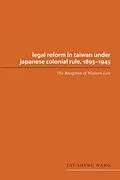Taiwan's modern legal system--quite different from those of both traditional China and the People's Republic--has evolved since the advent of Japanese rule in 1895. Japan has gradually adopted Western law during the 19th-century and when it occupied Taiwan--a frontier society composed of Han Chinese settlers--its codes were instituted for the purpose of rapidly assimilating the Taiwanese people into Japanese society.
Tay-sheng Wang's comprehensive study lays a solid foundation for future analyses of Taiwanese law. It documents how Western traditions influenced the formation of Taiwan's modern legal structure through the conduit of Japanese colonial rule and demonstrates the extent to which legal concepts diverged from the Chinese legal tradition and moved toward Western law.
Autorentext
Tay-sheng Wang is professor of law at National Taiwan University.
Inhalt
Preface
Introduction
Background of Legal Reform
Reception of Western Law in Colonial Legislation
Modern Judiciary in the Colony
Criminal Justice and Changing Society
Westernization of Civil Justice
Appraisal and Legacy
Conclusion
Appendix A: Development of Taiwanese Law
Appendix B: The Law Relating to Laws and Ordinances
Appendix C: The Civil, Commercial, and Criminal Law
Appendix D: The Bandit Punishment Law
Glossary
Abbreviations
Notes
Bibliography
Index
